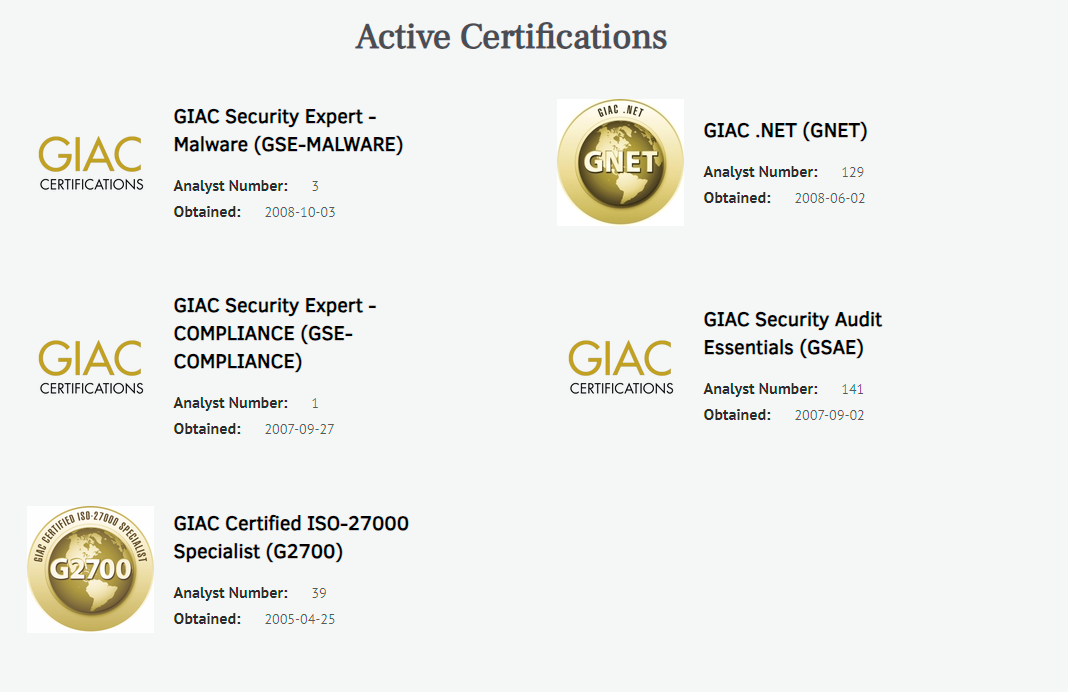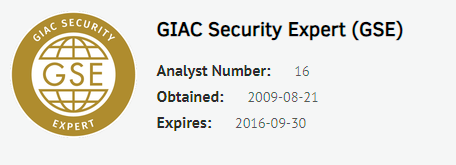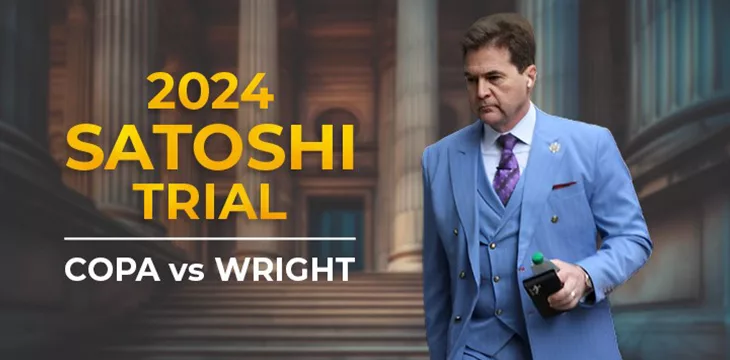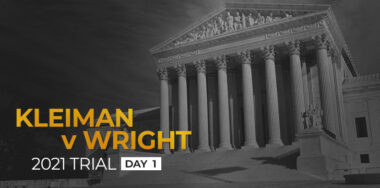This isn’t how it was supposed to go: after three full days with Dr. Craig Wright on the stand in an ‘oppressively’ hot London courtroom, COPA’s esteemed attorney Jonathan Hough KC has done nothing but run in circles each time he accuses Dr. Wright of manipulating documents he says proves his claim to be Satoshi Nakamoto.
It turns out Dr. Wright does have an answer to everything—answers packed with technical expertise that’s often obscure and even esoteric, but which are, above all, highly detailed and go a long way towards rendering COPA’s account of the alleged manipulations meaningless.
It’s a far cry from what some expected heading into the first week of the trial. Just a couple of weeks before, COPA published three expert reports jointly prepared by forgery experts appointed by COPA and Dr. Wright. Though neither side’s experts expressed any opinion on who did the manipulating, they agreed that large swathes of the documents Dr. Wright said he would be relying on at trial contained anomalies that showed signs of deliberate manipulation.
When grilled about these manipulations on the stand, Dr. Wright quickly began challenging the findings of both COPA’s and his own experts, drawing on his polymathic base of knowledge to provide answers to Hough KC’s challenges faster than he could pose them.
For instance, a number of pre-2009 documents being relied on by Dr. Wright to show he was working on Bitcoin before it was publicly released contain timestamps left by Grammarly software. These timestamps differ, but COPA says they all date to late 2023 and are evidence that Dr. Wright was actively editing these documents in the run-up to the trial.
Dr. Wright’s response? The simple revelation is that the enterprise version of the Grammarly software—which was not referenced by any ‘expert’ in the case—automatically leaves these timestamps whenever the document is opened—which naturally happens repeatedly in the course of discovery and trial prep.
On Wednesday, Dr. Wright and the court were shown a pre-Bitcoin network analysis and modeling paper containing connections to Bitcoin theory. COPA says this document is manipulated because the metadata shows its ‘last editing duration’ exceeds its ‘last saved’ date. Dr. Wright gave the same explanation he had given multiple times earlier in the week: he works in a Citrix virtual environment, and inconsistencies like that are a natural consequence of working in that way. He explains that these virtual environments allow multiple users to work simultaneously on the same ‘system,’ much like Google Docs does today. In that context, ‘saving’ can’t be thought of in the same way it does when working solely on physical machines.
Dr. Wright also took this chance to point out—as he did on his first day on the stand—that none of the experts appointed in this case have the expertise to draw these conclusions. “Neither expert is qualified in Citrix, and they are unqualified to make the claim,” he jabbed at Hough KC.
Earlier in the trial, he had made similar complaints about the experts appointed by both COPA and his own legal team. Neither have qualifications in virtual environments (such as Citrix) nor document forensics. One of his own experts (Spencer Lynch) included Dr. Wright said that Lynch doesn’t meet even the most basic level of forensics certifications mandated by the U.S. government, for example.
The Judge challenged Dr. Wright on this briefly, effectively asking Dr. Wright why he didn’t tell his lawyers to pick an appropriate expert. Dr. Wright referenced that his case had been handed between multiple law firms at a late stage in the pre-trial process, making it difficult to change course. Given the circumstances of these changeovers, it’s likely there is much more to this story that Dr. Wright is unable to explain, thanks to legal privilege.
By the end of the third day, the force of COPA’s challenges had regressed considerably. This culminated in a feeble attempt to discredit one of Dr. Wright’s early Bitcoin white paper
drafts form before the project was publicly revealed. Hough KC puts it to Dr. Wright that both sides’ experts agree this document was created using the publicly available version of the Bitcoin white paper and then edited to make it look like an earlier draft. The primary reason for this conclusion is that the draft contains ‘OBJ’ artefacts where the diagrams in the Bitcoin white paper ended up going; the implication is that this is the result of converting the published PDF paper to another format for editing.
But Dr. Wright flatly refuted this:
“There’s a couple of problems with that. [The diagrams] are not an embedded object in the Bitcoin white paper. It has searchable text because it’s a LaTeX-created document. If that was the case it would not come up as an object file because you have searchable text.”
Dr. Wright even issued something of a public challenge, inviting anyone to open up a published final copy of the white paper PDF and try it for themselves. Cue a flurry of typing within Courtroom 30 followed by the sound of laptop mousepads being frantically clicked. Observers went to check Dr. Wright’s claim in real-time. All would have found, as this writer did, that Dr. Wright’s claim is true.
As he’s been forced to do many times over the course of the trial, Hough KC coughed and spluttered before ungracefully moving on to his next point.
Wright’s performance shouldn’t be a surprise—he is the expert to beat all experts
This all should have been foreseeable, particularly if you’re familiar with Dr. Wright’s
encyclopaedic collection of qualifications, including more than 17 academic degrees and nearly countless professional certifications. But don’t take it from Dr. Wright: have a look at the public directory of GIAC (Global Information Assurance Certification) certified professionals. Craig Wright’s entry displays five active certifications, three of which are directly related to cybersecurity, in addition to 19 inactive ones.
However, the most intriguing part of this directory listing is that it displays the ‘analyst number’ under each certification, referring to whether the analyst was the first, second, third (and so on) person to achieve the qualification. Have a look at Dr. Wright’s:

For two of the security certifications, this page appears to show that Dr. Wright was the first and third person on the planet to achieve the certification. To illustrate just how remarkable this is, pulling up records of other professionals at random invariably shows numbers running into the tens of thousands.
What do these qualifications really mean, though? For one, according to GIAC, its GIAC Security Expert (GSE) certification is the most prestigious credential in the IT security industry. The GIAC website says, “those who achieve the GSE certification have proven their elite status as top information security practitioners in the field.”
Not only does Dr. Wright have this certification (albeit inactive), but he is apparently the 16th person in the world to ever receive the certification.

A random sample of other professionals’ directory listings shows that a GSE certification obtained ten years after Dr. Wright obtained his would only be the 255th ever awarded. In other words, holding this certification is a rare feat.
And those experts Dr. Wright told the court were unqualified and speaking beyond their areas of expertise? Not a single one is listed as a GIAC-certified professional, and their names return no results from the GIAC database.
Hough KC can’t have expected this, and he may never have come across anything like it in his 27-odd years as a barrister. Legal teams appoint experts to assist the court on matters that are beyond its own expertise. These are typically highly credentialed in their field, but the problem is that Dr. Wright is one of the most credentialed people in the world across multiple fields. Armed only with expert reports from professionals who are looking less qualified, every time Dr. Wright opens his mouth, Hough KC and COPA’s case is going nowhere fast.
New to blockchain? Check out CoinGeek’s Blockchain for Beginners section, the ultimate resource guide to learn more about blockchain technology.









